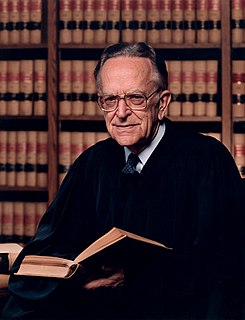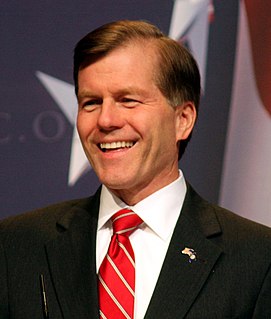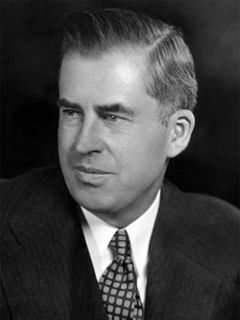A Quote by William J. Brennan
The door of the Free Exercise Clause stands tightly closed against any government regulation of religious beliefs as such. Government may neither compel affirmation of a repugnant belief, nor penalize or discriminate against individuals or groups because they hold views abhorrent to the authorities.
Related Quotes
We repeat and again reaffirm that neither a State nor the Federal Government can constitutionally force a person "to profess a belief or disbelief in any religion." Neither can constitutionally pass laws or impose requirements which aid all religions as against nonbelievers, and neither can aid those religions based on a belief in the existence of God as against those religions founded on different beliefs.
The Free Exercise Clause at the very least was designed to guarantee freedom of conscience by prohibiting any degree of compulsion in matters of belief. It was offended by a burden on one's religion. The Establishment Clause can be understood as designed in part to ensure that the advancement of religion comes only from the voluntary efforts of its proponents and not from support by the state. Religious groups are to prosper or perish on the intrinsic merit and attraction of their beliefs and practices.
The "establishment of religion" clause of the First Amendment means at least this: Neither a state nor the Federal Government can set up a church. Neither can pass laws which aid one religion, aid all religions, or prefer one religion over another. Neither can force nor influence a person to go to or to remain away from church against his will or force him to profess a belief or disbelief in any religion.
Besides the healthcare bill being unconstitutional and a great expansion of federal government, I think if it does not respect people's individual religious views and makes groups or individuals do things that are contrary to their deeply held beliefs, there is going to be a visceral negative reaction.
The Declaration [of Independence] was not a protest against government, but against the excess of government. It prescribed the proper role of government, to secure the rights of individuals and to effect their safety and happiness. In modern society, no individual can do this alone. So government is not a necessary evil but a necessary good.
It is curious that people tend to regard government as a quasi-divine, selfless, Santa Claus organization. Government was constructed neither for ability nor for the exercise of loving care; government was built for the use of force and for necessarily demagogic appeals for votes. If individuals do not know their own interests in many cases, they are free to turn to private experts for guidance. It is absurd to say that they will be served better by a coercive, demagogic apparatus.
The reality is if we sit back and allow a few officials behind closed doors to launch offensive attacks without any oversight against foreign nations, against people we don't like, against political groups, radicals, and extremists whose ideas we may not agree with, and could be repulsive or even violent - if we let that happen without public buy-in, we won't have any seat at the table of government to decide whether or not it's appropriate for these officials to drag us into some kind of war activity that we don't want, but we weren't aware of at the time.
The greatest bulwark against an overreaching government, as tyrants know, is a religious population. That is because religious people form communities of interest adverse to government control of their lives; religious communities rely on their families and each other rather than an overarching government utilizing force.
A famous, very often quoted phrase says: "That government is best, which governs least." I do not believe this to be a correct description of of the functions of a good government. Government ought to do all the things for which it is needed and for which it is established. Government ought to protect the individuals within the country against the violent and fraudulent attacks of gangsters, and it should defend the country against foreign enemies. These are the functions of government within a free system, within the system of the market economy.
Government want to tell you things you can't say because they're against the law, or you can't say this because it's against a regulation, or here's something you can't say because its a... secret; "You can't tell him that because he's not cleared to know that." Government wants to control information and control language because that's the way you control thought, and basically that's the game they're in.
I consider the government of the United States as interdicted by the Constitution from intermeddling with religious institutions, their doctrines, discipline, or exercises. This results not only from the provision that no law shall be made respecting the establishment or free exercise of religion, but from that also which reserves to the States the powers not delegated to the United States. Certainly, no power to prescribe any religious exercise or to assume authority in any religious discipline has been delegated to the General Government. It must then rest with the States.
No government has the right to decide on the truth of scientific principles, nor to prescribe in any way the character of the questions investigated. Neither may a government determine the aesthetic value of artistic creations, nor limit the forms of literacy or artistic expression. Nor should it pronounce on the validity of economic, historic, religious, or philosophical doctrines. Instead it has a duty to its citizens to maintain the freedom, to let those citizens contribute to the further adventure and the development of the human race.
































